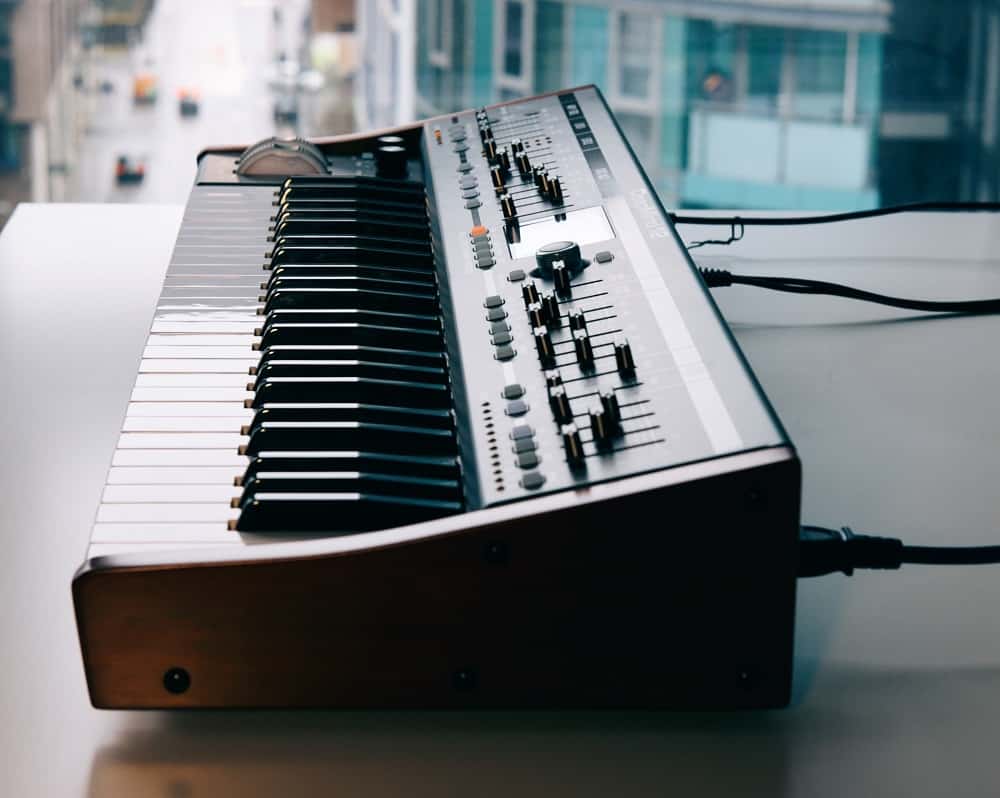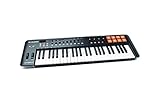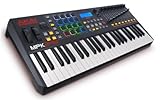A MIDI controller – Musical Instrument Digital Interface – is any hardware or software that generates and transmits data to MIDI-enabled devices, typically to trigger sounds and control parameters of an electronic music performance.
The most common type of MIDI controllers are keyboards, and these are available in sizes that range from 25-key, 2-octave models, to full-sized 88-key instruments.

You may find that a 61-key or 88-key is too big for the space you have to work in, and for your keyboard playing ability. On the other hand, 25-key controllers may be too small for two-handed playing.
That’s where 49-key controllers come in: they offer a great middle-ground between accommodating dexterous players while minimizing the amount of space the keyboard takes up.
That’s why we’ve focused this article on the best 49-key MIDI controller keyboards. We’ve scoured the internet for the best products on the market, and have compiled a list of those with the best features and highest ratings.
We’ve also provided a Buyer’s Guide and FAQ section to enable you to make an informed decision before committing to a purchase.
M-Audio Keystation 49 MK3

The Keystation 49 MK3 comes with a comprehensive software package that has everything you need to get you started, including Pro Tools, First M-Audio Edition, Ableton Live Lite, 2GB of sample content from Touch Loops, Xpand!2, Velvet, and Mini Grand from AIR Music Tech.
The 49 full-size velocity-sensitive keys provide a natural feel that captures every subtle nuance of your performance.
The volume fader, transport, and directional buttons provide you with easy control of your software, plus ergonomically designed pitch and modulation wheels, octave ‘up‘ and ‘down’ buttons, and sustain pedal input allow for expressive performances and greater creativity.
The compact design fits small desk spaces and studios, while the advanced functionality allows you to customize your controls for your recording software. The MK3 allows you to plug in and play almost immediately via a USB connection to your Mac or PC, and no drivers or power supply are required.
Pros
- Comprehensive software package
- Velocity-sensitive keys
- Solid, lightweight build
- Wide compatibility
Cons
- Some users hoped for more features considering the price
- Ultimate Expression - 49 full-size velocity-sensitive keys provide a natural feel that captures...
- Total Control - Volume fader, transport and directional buttons for easy control of your software,...
- Immediate Creativity - Easy plug-and-play connection to your Mac or PC—no drivers or power supply...
Last update on 2025-07-15 / Affiliate links / Images from Amazon Product Advertising API
Nektar, 49-Key Midi Controller (SE49)

The Nektar SE49 USB MIDI controller keyboard is equipped with all the features you need to start making music with your computer. Compatible with any MIDI music software, it features a full-size keyboard with velocity, and all you need to do to get it up and running is plug it into your computer’s USB port.
Seen as the SE49 is USB class compliant and doesn’t require a driver to operate, you’re up and running on Mac OS or Windows in seconds.
Featuring a full-sized keybed with 49 velocity-sensitive keys, the SE49 is fun and expressive to play and offers a defined and firm feel. It also offers 4 different velocity curves (as well as 3 fixed ones), enabling you to adjust the keyboard response to your needs.
The large Pitch Bend and Modulation Wheels have a tight grip and offer just the right degree of resistance for adding modulation to your playing.
The keyboard also features four buttons and one MIDI-assignable fader to the left of the keys, providing you with even greater flexibility.
With these, you can shift the octave and transpose, and the buttons can easily be assigned to switching MIDI channels, MIDI programs or even selecting tracks and browsing patches when Nektar DAW Integration is active.
Pros
- Quality feel for a fair price
- 4 different velocity curves
- Works with any MIDI software
- MIDI-assignable fade
- Supports Windows, Mac OS, Linux (Ubuntu), and Apple iOS (requires camera connection kit)
Cons
- Some users weren’t keen on the synth-action keys of the SE49.
- All the features and expressive control you need to start making music with your computer, and at a...
- Nektar DAW integration for most popular DAWs
- Comprehensive MIDI functionailty. Compatible with all MIDI music software applications
Last update on 2025-07-15 / Affiliate links / Images from Amazon Product Advertising API
Alesis V49 – 49 Key USB MIDI Keyboard Controller

With 49 full-size, velocity-sensitive square-front keys and 8 MPC-style drum pads, the V49 is perfect for playing virtual instruments and provides the building blocks for any modern music producer.
With the help of the Octave Up/Down buttons, you can expand the keyboard to the full melodic range and play bass lines, chords, and melodies, as well as use the modulation wheels and four assignable knobs and buttons to open and close filters, adjust volume levels, activate effects, tweak parameters, and more.
The Alesis V49 also provides seamless visual feedback via its illuminated buttons and knobs, while the V49 Editor software offers an easy, visual way to edit the various MIDI messages that your keyboard’s controls send to your computer.
You can also adjust the velocity curves of keys and pads to find the sensitivity that best fits your playing style. The V49 also comes with a premium software package that includes ProTools, First Alesis Edition, Ableton Live Lite 9, and Eleven Lite, to name just a few.
Pros
- Velocity-sensitive square-front keys and 8 MPC-style drum pads
- Visual feedback via illuminated buttons
- Easily adjustable settings
- Premium software package
Cons
- Some people encountered issues with sensitivity, though this was usually resolved by installing software updates.
- MIDI Keyboard with 49 full-sized, velocity sensitive square-front keys, perfect for playing Virtual...
- 8 velocity- and pressure-sensitive backlit pads for beat production and clip launching
- 4 assignable knobs and 4 assignable buttons interface with your music software. Seamless, visual...
Last update on 2025-07-15 / Affiliate links / Images from Amazon Product Advertising API
M Audio Oxygen 49 IV | 49 Key USB/MIDI Keyboard

This compact, ultra-portable performance keyboard controller is equipped with 49 full-size, synth-action, velocity-sensitive keys, and onboard pitch bend and modulation wheels to provide expression and creativity to your performances.
It has 8 velocity-sensitive trigger pads for beat production and clip launching, 8 assignable knobs, and 9 assignable faders for manipulating virtual instruments, DAW parameters, and plugins as well as an LCD screen that provides instant parameter feedback.
The dedicated octave ‘up’ and ‘down’ buttons increase the keyboard to the full melodic range, while the transport buttons let you control your DAW without reaching for the mouse.
This versatile MIDI keyboard also comes with a comprehensive production software package for Mac and PC worth over $100. Oxygen 49 offers out-of-the-box integration with popular DAWs including Ableton Live, Pro Tools, Logic, Cubase, and many more.
Pros
- Lightweight and portable
- 8 velocity-sensitive trigger pads
- 8 assignable knobs/9 assignable faders
- Comprehensive production software package
- Out of the box integration
Cons
- Getting used to the key velocity was difficult for those used to a weighted keyboard
- Compact, ultra portable performance keyboard controller with 49 full size, synth action velocity...
- 8 velocity sensitive trigger pads for beat production and clip launching; 8 assignable knobs and 9...
- Dedicated octave up and down buttons increase the keyboard to the full melodic range and transport...
Last update on 2025-07-15 / Affiliate links / Images from Amazon Product Advertising API
AKAI Professional MPK249

If you’re looking for a premium quality, professional standard MIDI controller keyboard, look no further than the AKAI MPK249.
The MPK249 comes equipped with 49 semi-weighted, full-size keys and a premium Akai Professional piano-style keybed for unprecedented response and a natural feel that captures every subtle nuance of your performance.
The onboard octave ‘up’ and ‘down’ controls allow players to access the entire melodic range, making this keyboard perfect for bass lines, piano harmony, solo leads, and much more.
It’s also equipped with beat-making essentials such as 16 RGB-illuminated MPC-style pads, each with 4 banks for 64 pads – the perfect solution for triggering samples, loops, one-shots, melodics, and more.
The 24 assignable Q-Link controllers comprising 8 control knobs, faders, and switches are engineered for hassle-free DAW / virtual instrument mapping, while the onboard USB-MIDI interface with 5-pin MIDI input and output allows greater control over your work.
It also comes with a comprehensive production software package for Mac and PC, including Ableton Live Lite, Hybrid 3 by AIR Music Tech and SONiVOX Twist 2.0.
Pros
- Semi-weighted, full-size keys
- 16 RGB-illuminated MPC-style pads
- 24 assignable Q-Link controllers
- Comprehensive software package
- Durable, solid construction
Cons
- Some people found the USB cable a little short
- It’s much more expensive than others on the market
- Pro Keyboard Performance - 49 semi-weighted, velocity-sensitive full-size keys and a premium...
- Beat Making Essentials - 16 RGB-illuminated MPC-style pads each with 4 banks for 64 pads - the...
- Assignable Control - 24 assignable Q-Link controllers comprising 8 control knobs, faders and...
Last update on 2025-07-15 / Affiliate links / Images from Amazon Product Advertising API
Buyers Guide
Control options
Before purchasing a MIDI controller, check its specifications to ensure it offers the control features you need. If you only want to control computer software then all of the options above offer this, although some offer more control options than others.
If you’re looking to control external hardware, such as a stand-alone synth, then you’ll need to look for a MIDI controller that explicitly says it will do this, ie. the ones that come with a 5-pin MIDI-out port.
Software Integration
Most of the MIDI keyboards on our list come with presets or automatic configuration options that make it easy to integrate with most major DAWs. These may require you to download some extra files from the manufacturer’s website.
If you’re interested in ensuring that the MIDI keyboard is compatible with a particular software, then ensure you check this beforehand, though like we say, most are diverse and are compatible with all of the major DAWs.
Transport Controls
By transport controls we mean the buttons dedicated to controlling standard DAW recording controls, such as Play, Stop, Rewind, Fast Forward, and so forth. These can come in extremely handy, as they allow you to maintain your recording workflow without having to reach for your computer mouse.
Key Size and Weight
Some 49-key controllers have full-sized keys but not all of them do. Most of these MIDI keyboards will also feature ‘synth action’ keys rather than piano-style full-weighted keys, with the latter offering much better precision with velocity.
If you’re a piano player and you need piano-style keys, ensure you read the specifications carefully to check that the keys are right for you, or consider opting for an 88-Key controller instead.
Here’s the difference between synth-action and semi-weighted keys, which are the two most popular types of keys for MIDI keyboards:
Synth-Action: Chances are your MIDI keyboard is going to come with synth-action keys. These are the cheapest options for keys, as they’re made of plastic, and they use springs instead of weights to return the keys to their original position. That said, they usually work pretty well on MIDI keyboards, but some people used to heavier keys may find it difficult to adapt.
Semi-Weighted: These types of keys are designed to be a midpoint between weighted keys and synth-action keys, and they’re more likely to appear on the middle-to-high end of the price range. They use a combination of springs and light weights to return the keys to their original position and offer slightly more precision than synth-action keys.
Power Supply
Most MIDI controller keyboards are powered by USB, though some may be battery powered. USB drains battery power quickly, but it’s also the most flexible and is widely compatible with a range of devices and computers.
However, you should also bear in mind the type of device you’re connecting the MIDI controller to, as smaller devices such as iPads will only provide 100mA instead of the USB 2.0 standard of 500mA.
If you struggle to get enough power from your device, you can use a powered USB hub or use a power adapter to supply the keyboard directly.
Durability
Durability will usually tie in with the price you’re paying for a MIDI controller. For example, the more you spend, the higher the quality of the keyboard is likely to be, though this isn’t always the case.
If you’re looking for a lightweight and portable MIDI controller keyboard, ensure this doesn’t compromise on durability, and if you’re looking for one with sturdy construction, ensure that it fits into the space where you’ll be using it.
You want a keyboard with solid construction and sturdy knobs and buttons, but also one that offers portability if you’re using it for performances, at home, and in the studio, for example.
Price
As a midway point between the compact 25-key controllers and the 88-key instruments, the 49-key midi controllers are also available for a medium price point. We suggest shopping in the $80-$500 price range depending on your budget.
If you’re new to music production, you may wish to opt for a cheaper model that you can upgrade at a later date, whereas if you’re a seasoned pro, you may wish to invest in something that will last a little longer.
Benefits of a 49-key MIDI controller keyboard
- For most musicians, the central benefit of having 49 keys is the ability to play five octaves. This offers versatility to play melody and harmony while still enabling you to play in some traditional styles.
- The 49 key models also provide more knobs and patches than other types of keyboards, thus allowing more expressive sounds and greater creativity. They also offer more recording and playing options for musicians.
- 49 key controllers also provide a balance between recording and playing. You can enjoy easy recordings and still have plenty of options for creative playing.
- The size of these controllers is another benefit. These models are lightweight and easy to transport to different locations for performing. They also take up less space than some of the larger controllers, while not appearing as cramped as the smaller ones.
Frequently Asked Questions
Is a 49 key MIDI keyboard enough?
It depends on your playing background and what you’re looking to get out of your MIDI keyboard.
A 49-key can feel cramped for some people, and if you plan on doing plenty of two-handed playing, 61 keys may be preferable.
On the other hand, if you’re doing a little two-handed playing but mainly using zones on the keyboard, 49 keys may be enough, though it’s most suitable for a one-handed player tired of hitting the octave buttons all the time.
They’re also ideal if you’re looking for a more compact and portable option to a 61 or 88-key controller. If you’re just starting out, you might find that 49-keys is plenty, as it still allows you to get to grips with the basic techniques.
Can I learn piano on 49 keys?
In the long run, it’s always better to learn piano on a full-sized 88-key keyboard. However, as we said above, 49 keys are enough to get started. The piano is essentially made up of repeating sets of 12 notes, so as long as you have a few sets to get started with, you will be fine.
Obviously, as you progress, you’ll want more space to work with so you can play comfortably with two hands. The other thing to bear in mind is that a MIDI controller usually has synth-action keys, which feel very different from traditional weighted keys found on a piano.
Do I need a 49 key MIDI controller?
49-keys is the ideal number for studio MIDI controllers. This is because they’re less unwieldy and clumsy than their 88-key counterparts, but also provide greater playing space and versatility than their 25-key counterparts.
They give you a full four-octave range, which is more than enough to play complex melodies without shifting up/down octaves, and they usually come equipped with a range of settings, drum pads, and faders to allow you to maximize creativity.
They also offer a good balance between settings and size, while remaining compact enough to ensure portability.
Recent Posts
QuickTime is a vital app for many Mac users, and if you’ve recently bought a new microphone, you might wonder how to use it optimally. QuickTime cannot record audio content if it doesn’t have...
Every microphone leaves a unique signature on the quality of its output. If you’re a podcaster trying to melt your way into your audience’s hearts, a muddy, distorted recording won’t cut it....





